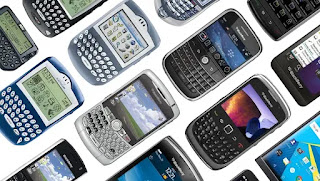In the mid-2000s to early 2010s, BlackBerry is a mobile phone that is synonymous with exclusivity and luxury. But, now his name is just a memory because old BlackBerry phones were actually injected with death after support for BlackBerry OS was discontinued.
BlackBerry is discontinuing support for BlackBerry OS 7.1 and earlier, BlackBerry 10, and BlackBerry PlayBook OS 2.1 and earlier. Support for the operating system ends on January 4, 2022.
To commemorate the heyday of BlackBerry, let's flashback from when its popularity rose to its collapse, as quoted from ZDNet, Sunday (9/1/2022).
BlackBerry Awakening
BlackBerry, or previously also known as Research in Motion (RIM) began to climb in 1999 with the launch of the BlackBerry 850. This is a pager-like device that supports two-way email communication with a physical QWERTY keyboard.
Although the 850 is known as the foundation of BlackBerry devices, this Canadian company only launched 'smartphones' in 2003 with the launch of the BlackBerry 6200.
While all cell phones still carry flip or candybar designs, the BlackBerry 6200 has a monochrome screen above a QWERTY keyboard and a few navigation buttons. This phone also provides email service via 2G network.
This phone was followed by variants that carried color screens such as the BlackBerry 7100 and 7200. Several next-generation BlackBerry phones also brought improved displays, new exterior designs, and the arrival of new features such as Bluetooth.
Then in 2007, RIM launched one of the most popular BlackBerry models, the BlackBerry Curve. This new model also makes it easier for users to navigate the phone thanks to the iconic trackball support.
This trackball was later replaced with a trackpad in the BlackBerry Bold line. Even so, the BlackBerry Curve remains a design guide for future BlackBerry phones.
The birth of competition
Bad news for the BlackBerry Curve, 2007 was the same year Steve Jobs introduced the first generation iPhone. Unlike the BlackBerry, which relies on a full QWERTY keyboard, the iPhone offers a touch screen for all operations.
In addition to more user-friendly input, there is one Apple strategy that makes the iPhone quickly accepted by consumers. If BlackBerry phones are more targeted at businesses, Apple immediately directs the iPhone to ordinary consumers.
In the same era, Android also began to be born and followed in the footsteps of consumer-centric like Apple. Coupled with application store innovations that allow third-party developers to enter their applications, iPhone and Android are superior to BlackBerry.
To respond to the two newest competitors, BlackBerry is trying some new innovations in the design of their phones. Like the BlackBerry Storm which is the first phone that is fully operated using a touch screen.
Unfortunately this phone received negative reviews ranging from poor software integration, buggy software, and poor user experience. BlackBerry Storm 2 which was released in 2009 also had the same fate.
Beginning of the fall
The last best year for BlackBerry was 2010. But in the second half of 2010, BlackBerry's performance in the market began to decline, both in terms of sales and number of users.
Based on data from ComScore, RIM accounted for 37.3% of the total mobile phone users in September 2010. Meanwhile, Apple and Google controlled 24.3% and 21.4%, respectively.
In December 2010, the portion held by RIM decreased by five points to 31.6%, while Google rose by seven points to 28.7%. From there the collapse of the BlackBerry was inevitable.
In early 2011, Android overtook BlackBerry and took up 31.2% of users. RIM's market share then fell freely into single digits, and at the end of 2014 they only controlled 1.8% of total mobile phone users.
BlackBerry Priv running Android OS Photo: The Verge
BlackBerry does not remain silent in the face of its deteriorating fate. They tried various ways ranging from presenting a new operating system that focuses on touch screens, and finally releasing phones that run Android.
But it was too late because the influence of Apple and Google was too great. BlackBerry then stopped producing phones in 2016 and turned into a software and cybersecurity company.
Lethal injection
Although it is no longer producing mobile phones, the BlackBerry name is still alive after being licensed to other companies such as TCL to produce mobile phones under the BlackBerry brand. But even this didn't last long, and in 2020 BlackBerry broke up with TCL.
Not only his phone, some of his iconic services are also slowly shutting down. Such as BlackBerry Messenger which was injected dead in 2019 and the BlackBerry OS operating system which recently discontinued support.
The good news is that BlackBerry phone users running the Android operating system will not be affected and can still be used as usual.
In addition, reportedly there is a company that will give birth to a BlackBerry phone with 5G support. That company is OnwardMobility, the company that acquired the rights to manufacture BlackBerry-branded phones.
The plan was announced in August 2020 and is scheduled to launch in 2021. Although there was no news, OnwardMobility confirmed that the project is not dead and they are still planning to launch BlackBerry 5G with a high level of security.

